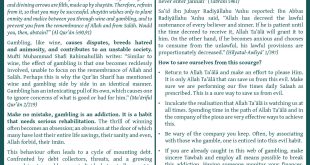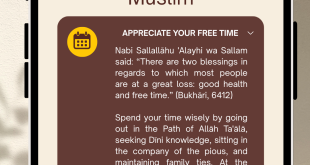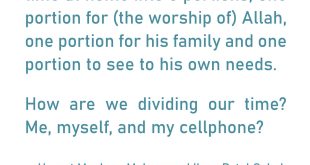Allāh Ta’ālā says in the Qur’an Kareem: “And verily (O Muhammad Sallallāhu ‘Alayhi wa Sallam), you are of extremely Noble character.” (Qur’ān Karīm, 68/4)
Allāh Ta’ālā declares Nabi Sallallāhu ‘Alayhi wa Sallam as having the loftiest character. Our love for Him demands that we emulate his noble character and ways.
Sayyidah ‘Āi’shah Radhiyallāhu ‘Anha was once asked about the character of Nabi Sallallāhu ‘Alayhi wa Sallam. She replied: “His character was the Quran.” (Musnad Ahmad, 25813)
The Akhlāq (character) of Nabi Sallallāhu ‘Alayhi wa Sallam demonstrates a perfect balance between a kind, tender, and gentle disposition coupled with a firm and resolute approach when the occasion demands.
If we try to remain the same in all situations, we could either compromise our Dīn or drive people away with our sternness. We must mould our personalities in this balance.
Gentleness of Sayyidunā Rasūlullāh Sallallāhu ‘Alayhi wa Sallam
Our Beloved Nabi Sallallāhu ‘Alayhi wa Sallam was the softest, most lenient, and most tolerant of all people.
Allāh Ta’ālā says in the Qur’ān Karīm: “It is out of Allāh’s mercy that you have been so kind with them. Had you been harsh or hard-hearted, they would have certainly abandoned you.” (Qur’ān Karīm, 2/159)
Sayyiduna Anas Radhiyallāhu ‘Anhu narrates: “I was walking with Nabi Sallallāhu ‘Alayhi wa Sallam while He was wearing a Najrāni shawl with a rough border. A bedouin caught up to Him and yanked his shawl most severely. I looked at the blessed neck of Sayyidunā Rasūlullāh Sallallāhu ‘Alayhi wa Sallam and noticed that the shawl left a mark on it because of the severe tug. The bedouin then said: “O Muhammad! Give me some of the wealth of Allāh that you have by you.” Nabi Sallallāhu ‘Alayhi wa Sallam turned towards him (without being affected by his crude approach), smiled, and ordered that he be given something (as a gift).” (Bukhāri, 3149)
Many such instances show the forbearing and tolerant nature of Nabi Sallallāhu ‘Alayhi wa Sallam. However, these are all regarding instances where Nabi Sallallāhu ‘Alayhi wa Sallam was personally affected and in matters that did not transgress the Sharī’ah.
Standing firm upon the commands of Allāh Ta’ālā
Sayyidah ‘Ā’ishah Radhiyallāhu ‘Anha says: “I have never seen Rasūlullah Sallallāhu ‘Alayhi wa Sallam take revenge for any harassment that he experienced, as long as no parameters of Allāh were violated. If any limits of Allāh were transgressed, then (with regards to Allāh Ta’ālā’s laws) Rasūlullāh Sallallāhu ‘Alayhi wa Sallam would be the severest in anger…” (Shamā’il Muhammadiyyah, 349)
This is the difference we must understand. While tolerance and forbearance are tremendously praiseworthy traits, they cannot be used for anything that goes against the Sharī’ah. Where Dīn is being distorted, tolerance demonstrates complicity. Showing tolerance where the commands of Allāh Ta’ālā are being broken is called “Mudāhanat”. This is a severe crime in Islām and is against the very practice of Sayyidunā Rasūlullāh Sallallāhu ‘Alayhi wa Sallam.
There are numerous instances in the Mubārak life of Nabi Sallallāhu ‘Alayhi wa Sallam where he taught us the balance between leniency and firmness.
Nabi Sallallāhu ‘Alayhi wa Sallam cursed the kuffār in certain instances where their transgressions or oppression exceeded the bounds. On the day of Khandaq, Nabi Sallallāhu ‘Alayhi wa Sallam cursed them thus: “May Allāh fill their homes and their graves with fire! They prevented us from our Asr Salah when the sun was (about to) set.” (Bukhāri, 2931)
On another occasion, Nabi Sallallāhu ‘Alayhi wa Sallam cursed the tribes of Ri’l and Zakwān when they massacred a group of Sahābah Radhiyallāhu ‘Anhum. Nabi Sallallāhu ‘Alayhi wa Sallam displayed the necessary firmness where the occasion demanded.
No tolerance when the Dīn of Allāh Ta’ālā is being compromised
Once, Sayyidunā ‘Umar Radhiyallāhu ‘Anhu brought a book that he acquired from a Jew to Rasūlullāh Sallallāhu ‘Alayhi wa Sallam and said: ‘O Rasūlullāh! I have a good book from the people of the book.’
Rasūlullāh Sallallāhu ‘Alayhi wa Sallam became so angry that his Mubārak face became red, and he Sallallāhu ’Alayhi wa Sallam then said: “Are you being reckless, O son of Khattab?! By the oath of Allāh! I have brought it (this religion) to you in a bright and clear state. It should not be that you end up denying the truth they tell or believing the falsehood they tell. By the oath of Allāh! If (Nabi) Mūsā (‘Alayhis Salām) were alive today, he would have no other option but to follow me.”
On another occasion, a woman of noble descent stole, and the Hadd (capital punishment) was due to her. Some Sahābah Radhiyallāhu ‘Anhum found this difficult, and they asked Usāmah bin Zaid Radhiyallāhu ‘Anhu (the beloved of Nabi Sallallāhu ‘Alayhi wa Sallam) to intercede on her behalf. Nabi Sallallāhu ‘Alayhi wa Sallam asked him: “Are you (really) interceding with regards to a Hadd from the Hudūd of Allāh?” He then gave a khutbah and proclaimed that “By Allāh, even if Fātimah the daughter of Muhammad were to steal, I would cut off her hand…” (Bukhāri, 3475)
We should understand the balance in what constitutes true Akhlāq. We must endeavour to be as soft, kind, and forgiving as possible, but when it comes to the Dīn of Allāh, it becomes praiseworthy to show anger and displeasure.
To be stern and severe in the face of challenges and to protect our beautiful Dīn from distortion is not against the Sunnah of our beloved, Sallallāhu ‘Alayhi wa Sallam.
Compromising our Dīn to fit in or be politically correct is actually betrayal.
May Allāh Ta’ālā grant us the proper understanding of Dīn, and may He grant us the beautiful Akhlāq of Nabi Sallallāhu ‘Alayhi wa Sallam, Āmīn!
3 Rabi ul Awwal 1445 / 19 September 2023 A0038
 Wifāq ul Ulāma (SA) ASSOCIATION OF SOUTH AFRICAN 'ULAMA
Wifāq ul Ulāma (SA) ASSOCIATION OF SOUTH AFRICAN 'ULAMA



